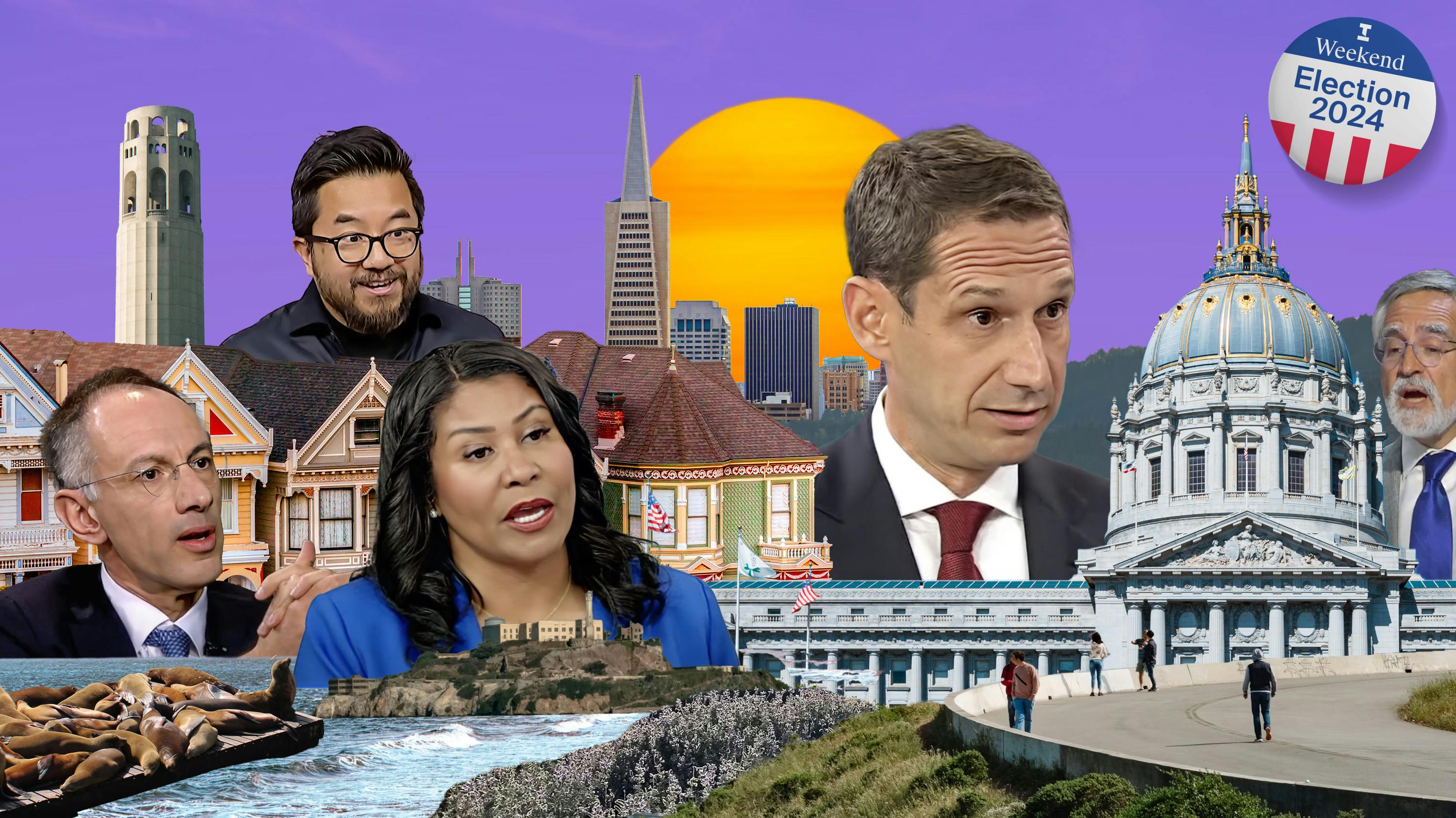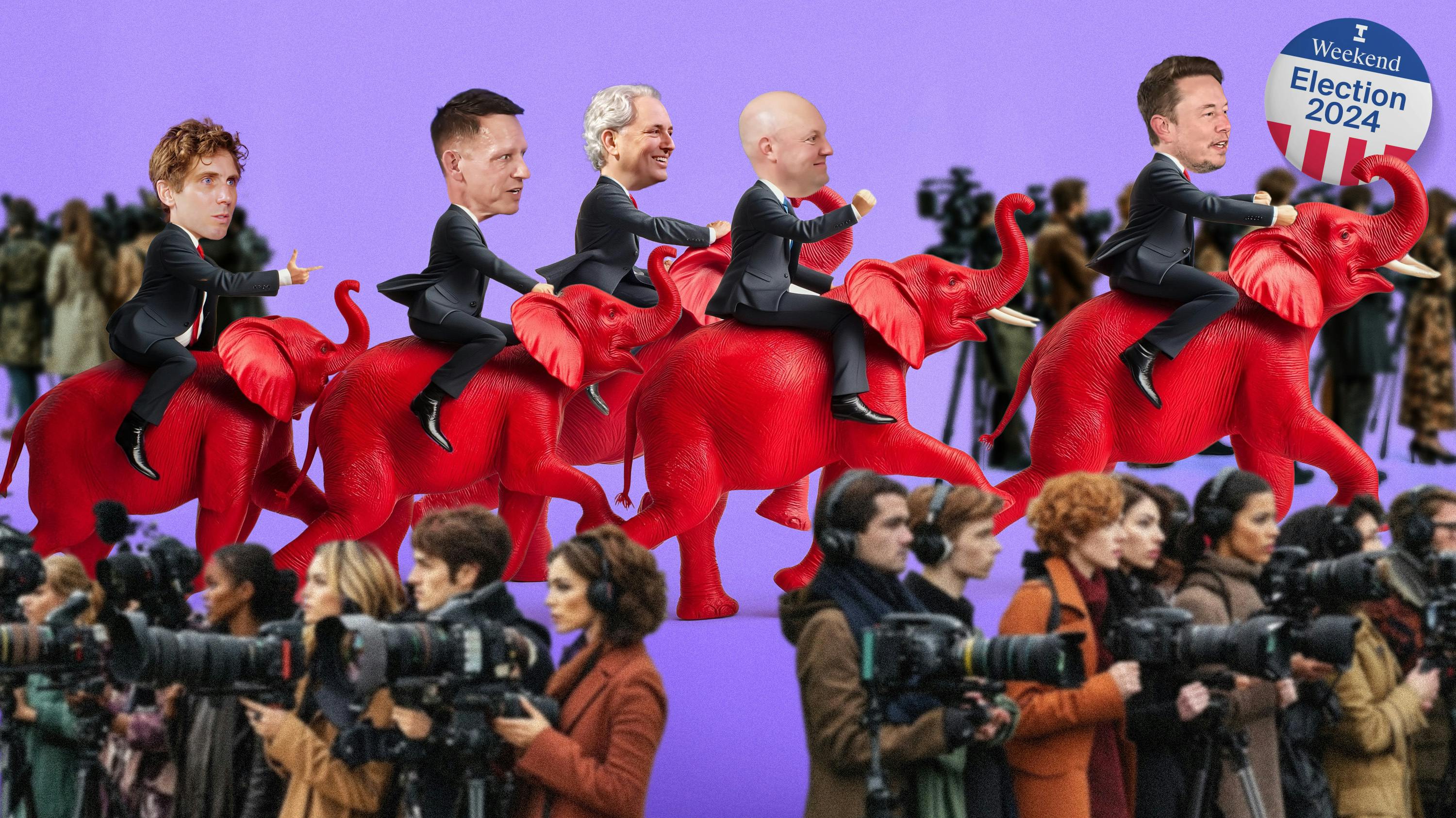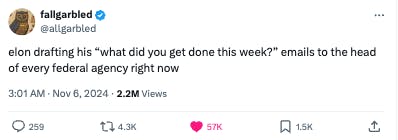| Welcome, Weekenders! In this newsletter: |
| • The Big Read: Tech has bought itself a more moderate San Francisco |
| • Power and Influence: San Francisco's new mayor vows 'city is open for business' |
| • Media: How tech's conservative shift went unnoticed for so long |
| • Plus: How Stevie Wonder still wows; a fertile drama in Leningrad; and the witch is back. |
| |
| Most of the major AI companies choose to play it safe on Election Night. Google prevented Gemini from making any replies about the election, while OpenAI pushed off readers to news organizations such as Reuters. Safe choices. The companies apparently feared their chatbots might help spark election misinformation by misstating information, as they sometimes do. |
| Meanwhile, Perplexity, as it is wont to do, took a different path. The decision seemed good at the time, but I'm surprised it didn't raise more eyebrows. |
| Perplexity released what it trumpeted as an "Election Information Hub." It got quite a bit of media attention and love, which is clearly what Perplexity could use after a year in which it has run afoul of many major media companies. Yet the hub's shiniest piece was an election results tracker…fed by Associated Press data. Perplexity's tracker looked like every other media outlet's election tracker. |
| But wait—so Perplexity is a media outlet? It's certainly not valued as one: It has recently secured a fresh $9 billion valuation for itself, an eightfold increase in seven months. So what exactly is Perplexity? It's hard to precisely say. It's a sort of souped-up search engine site powered by AI (as much good as that is). It also likes to act like a media business when that suits it, with features like the election tracker and its news summary Pages feature, which landed the startup in hot water when the company plagiarized a Forbes story to feed a Page earlier this year. |
| To be sure, Perplexity CEO Aravind Srinivas is in a difficult spot (as our Kevin McLaughlin described in a Weekend Big Read several weeks ago). He needs to keep finding ways to appease the investors throwing money at him, and he knows he can't just do what OpenAI and Google are doing and build large language models. (The competition is too stiff and the development costs are too high—even with the amount of money he has raised.) He also knows other startups have tried AI-powered search before, and no one has been able to turn it into a company that could support a $9 billion valuation. |
| So Srinivas seems to be borrowing bits from the media industry playbook to jazz things up. Such uneasy threading likely reflects a real conundrum that stretches across other AI startups like his—ones that have risen alongside the OpenAIs and the Anthropics but don't have the same technology or commercial potential underpinning them. Often these runner-up names have attracted investors who missed out on those industry leaders but badly want to bet capital somehow on the AI boom. I wonder if we'll someday regard those decisions as irrational choices made in a kind of mania. |
| Obviously, none of Srinivas' investors is panicking at the moment. How could we tell if their mood shifts? When they begin valuing Perplexity like a media startup. |
| The Resistance to a Resistance |
| Silicon Valley seemed on the verge of civil war at different points this year over the presidential election, which made me curious whether another potent anti-Trump resistence movement would spring up if he won, just as it did in 2016. That would've thrown a major lifeline to a number of media companies that could use the same readership influx the resistance brought last time. |
| Well, Trump did win, and, in bad news for parts of the media, none of that resistance energy is resurfacing anywhere in America—not even in liberal tech land. After Tuesday night, plenty of tech Democrats offered swift congratulations to Trump and/or his Silicon Valley surrogate, Elon Musk. And the stock market has soared. |
| When our Josh Koehn asked new San Francisco Mayor Daniel Lurie his thoughts about the liberal haven's place in a Trump America, Lurie tellingly steered well clear of the topic. "We have a lot of work to do here in San Francisco to make sure that we have clean and safe streets and do the basics, so that we have business come back, that we have our artists and our creatives come back," Lurie said. "My mind is focused on that." I'm sure his comment will please many of the tech elite who've wished for a moderate San Francisco.—Abram Brown |
| |
|
 |
|
| I won't waste more words about how San Francisco has fallen apart over the last few years—because there's a very good chance that could soon all change, as our Josh Koehn reports in this week's Big Read. |
| The moderate wave that has been building since 2022 in the city—obviously one of the most liberal havens in America—reached its full height this week in an election that upended who holds power. The incoming politicians are vowing to focus on economic development, building more housing and tamping down on crime, and they've been propelled to office partly by the tech elite, including Yelp CEO Jeremy Stoppelman. |
| "I think we've had plenty of time with quote-unquote 'progressive policies,' and you can kind of see the result," Stoppelman told Josh. "With this swing back towards moderate [policies]—albeit by San Francisco standards, not national standards—I do believe that will result in a better-run city." |
|
 |
|
| A year ago, Daniel Lurie was an unknown to most San Franciscans—a Levi Strauss heir who'd founded a noble enough nonprofit, Tipping Point. What a difference 12 months make! In an election that became a reckoning over far-left liberalism in San Francisco, Lurie, a moderate Democrat, toppled incumbent Mayor London Breed on the promise of a safer, better-run city—a vision that could respark the financial and cultural forces that have evaporated since 2020. |
| As I mentioned above, Josh spoke to Lurie about his vision for San Francisco. "We are going to make sure that we remain the home of AI, and that we welcome entrepreneurs and innovators of all shapes and sizes back to San Francisco," Lurie told Josh. He wants newer figures like Sam Altman and older ones such as Marc Benioff to help out. |
| Lurie added: "It's not just big employers that want public safety.…I'm excited about our future. Obviously, it starts with safety: clean streets, making sure we get our behavioral health crisis under control and getting people the help that they need." |
|
 |
|
| Sometimes our Julia Black talks about a reporting trip she took to Austin, Texas, a few years ago that creates a bemusing picture in my mind: a madcap Julia zipping around the city on a Bird scooter (remember those?) as she reported a huge tip on Elon Musk—that the billionaire had secretly fathered twins with one of his executives, Shivon Zilis. Why? Musk belongs to the pronatalist movement—a group that believes the world needs to get more productive at baby making—and over time it has become evident that pronatalism is one of the sub-labels of the new right. |
| I enjoy reflecting on the anecdote because it's such a time capsule of a moment when Bird scooters were still a thing, the media didn't fully understand Musk, and too many media outlets were largely unaware of the tectonic shifts in politics occurring around them. |
| Julia detected those tremors and leaned into trying to understand them while much of the media was dismissing them as inconsequential. After Tuesday's consequential victory for Donald Trump and his Silicon Valley backers, she has spent time thinking about how so many outlets failed to understand what was happening until a new set of Trumpish technorati had already fully formed—and about what we might expect to happen next. |
| Abram Brown, editor of The Information's Weekend section, has already turned his Magic Wall into a Thanksgiving seating diagram. You can reach him at abe@theinformation.com or find him on X. |
| |
 |
| Listening: Isn't He Lovely |
| In 2017, Stevie Wonder played a surprise set for Forbes magazine's 100th anniversary party at Chelsea Piers. Back then, I worked at Forbes, and at the fete, I distinctly remember Wonder's surreal effect on the crowd: I've never seen anyone—before or since—command the attention of a room full of the world's wealthiest and most powerful people quite like him. AOL billionaire Steve Case stood there with his mouth hanging open—in utter disbelief at Wonder's appearance—while many others filmed every second via iPhone, like Eras Tour teens. At one point, Wonder and Warren Buffett dueted on "The Glory of Love," a song first made popular by Benny Goodman and later made popular again by "Guess Who's Coming to Dinner?" |
| Until that evening, I'll admit I didn't quite fully appreciate the extent of Stevie's sway. More recently, I've learned more about that subject at great length with Audible's "The Wonder of Stevie." The podcast is a special pleasure given who hosts it: Wesley Morris, who has twice won the Pulitzer Prize for culture criticism, for good reason. He separates the series into studied examinations of five albums Wonder released in just about the same number of years: from "Music of My Mind" in 1972 to "Songs in the Key of Life" in 1976. The guests who joined Morris to talk about Wonder further underline the extent of his celebritydom: Dionne Warwick, Smokey Robinson, Questlove and the Obamas.—A.B. |
| Reading: Roots and Ruin |
| As both the Nazis and a cruel winter lay siege to Leningrad in 1941, the scientists at the Plant Institute faced a terrible dilemma: They were starving and freezing, with daily rations down to less than half a loaf of bread and temperatures at 40 below zero. Should they eat the irreplaceable specimens stored within the decaying mansion that housed the institute or continue protecting the valuable plants, which the Soviets hoped would propel the country's post-war future? |
| The scientists' grim choice is one of many drama-rich plotlines around the Plant Institute in "The Forbidden Garden" by Simon Parkin, a New Yorker contributor who has also written for Weekend. Parkin makes the institute a useful gateway to revisiting moments from history that might otherwise seem too familiar: the Bolsheviks' rise, Joseph Stalin's reign of terror and, obviously, the siege of Leningrad. |
| Started in 1924, the USSR's Plant Institute amassed the world's largest seed collection, and the Russians hoped it would put Soviet agriculture far ahead of any rival nation's. That vision never came to fruition. For starters, Stalin imprisoned the institute's beloved leader, Nikolai Vavilov. And then the Nazis invaded. |
| As Leningrad's conditions worsened, the institute's "tiny, traumatized, cloistered community" of scientists—a pea expert, an oats savant and a man with an apple variety named after him, among many others—soldiered on, learning how to protect the institute's roof from incendiary bombs. Answer: Get them off the roof as quickly as possible.—A.B. |
| Watching: Payback's a Witch |
| Marvel has suffered from a jinxed run of things since the studio last debuted a TV series from showrunner Jac Schaeffer: That was "WandaVision" in 2021, which ended just where Schaeffer's latest effort, "Agatha All Along," picks up on Disney+. I won't go so far as to say that "Agatha" alone can lift the curse that has befallen Marvel lately. It has too small a scope for that, and therein lies its appeal: Largely, the show doesn't try to draw life force from serving Marvel's broader, bloated mythology. No, "Agatha" is about the hang and the vibes—wacky, campy ones generated by a stacked cast that has Kathryn Hahn as the titular Agatha, a vengeful, murderous witch who first appeared in "WandaVision," along with Patti LuPone, Debra Jo Rupp and Joe Locke (the sweetheart kid from "Heartstopper"). Marvel aside, it would make a fine hair-of-the-crone tonic for any spooky season hangover.—A.B. |
| |
|
| How hardcore. |
 |

0 comentários:
Postar um comentário